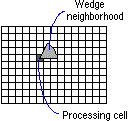 |
This document is archived and information here might be outdated. Recommended version. |
 |
This document is archived and information here might be outdated. Recommended version. |
Sets a wedge neighborhood object.
[Visual Basic .NET] Public Sub SetWedge ( _ ByVal radius As Double, _ ByVal startAngle As Double, _ ByVal endAngle As Double, _ ByVal unitsType As esriGeoAnalysisUnitsEnum _ )
[C#] public void SetWedge ( double radius, double startAngle, double endAngle, esriGeoAnalysisUnitsEnum unitsType );
[C++]
HRESULT SetWedge(
double radius,
double startAngle,
double endAngle,
esriGeoAnalysisUnitsEnum unitsType
);
[C++]
Parameters radius [in]
radius is a parameter of type double startAngle [in]
startAngle is a parameter of type double endAngle [in]
endAngle is a parameter of type double unitsType [in]
unitsType is a parameter of type esriGeoAnalysisUnitsEnum
|
radius |
the radius distance value for the wedge neighborhood. The radius is identified in cells measured perpendicular to the x- or y-axis. |
|
startAngle |
the value of the angle to calculate the start of the wedge neigborhood. |
|
endAngle |
the value of the angle to calculate the end of the wedge neigborhood. |
|
unitsType |
An esriGeoAnalysisUnitsEnum defining the type of units to calculate the neighborhood. |
A wedge-shaped neighborhood. The wedge is specified by the start angle, an end angle, and a radius. The wedge extends the radius distance counterclockwise from the starting angle to the ending angle. Angles are specified in degrees, with 0 or 360 representing East. Negative angles may be used.
